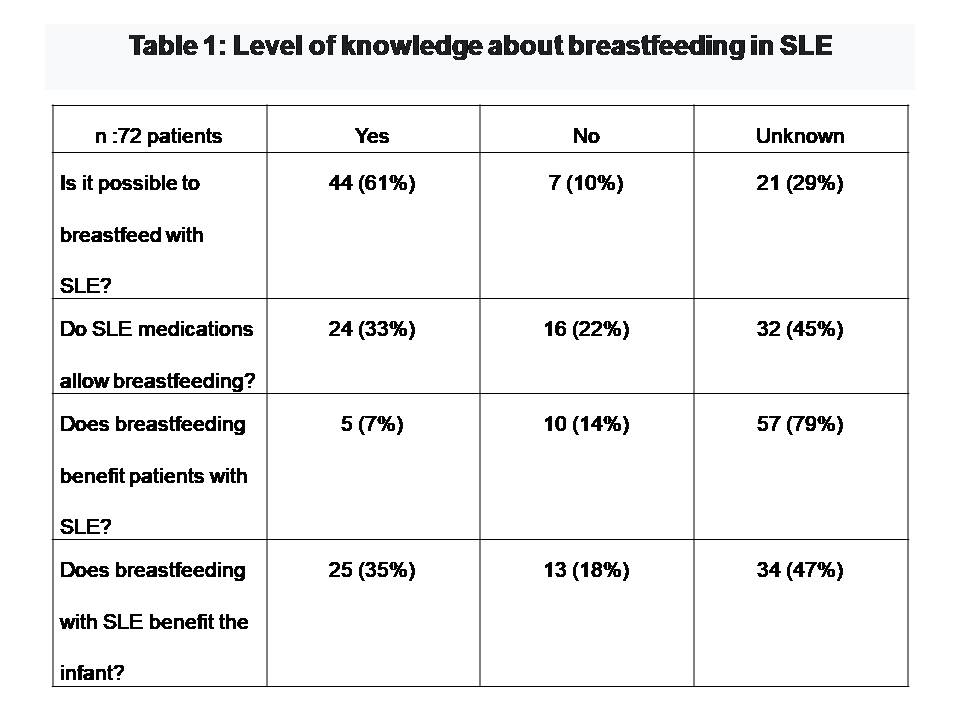Session Information
Date: Sunday, November 12, 2023
Title: (0460–0479) Reproductive Issues in Rheumatic Disorders Poster I
Session Type: Poster Session A
Session Time: 9:00AM-11:00AM
Background/Purpose: Breastfeeding in systemic lupus erythematosus (SLE) has received little attention and the limited data available suggest that women with SLE have lower breastfeeding rates and sustain it for less time than the general population. This study aimed to assess the knowledge about breastfeeding in patients with SLE, estimate the breastfeeding intention rate, and consider the impact that SLE activity and the information on lactation provided by hydroxychloroquine and prednisone patient information leaflets (PILs) could have on breastfeeding intention.
Methods: A cross-sectional study was performed through an anonymous, closed, multiple-choice survey. Outpatients with SLE (meeting EULAR/ACR 2019 classification criteria) treated at a public hospital, aged 18 or older, and of childbearing age were surveyed. The authors conducted the surveys during medical consultations. Personal data (age, level of education) and past pregnancy and lactation experience were collected. Prior knowledge about breastfeeding in SLE was evaluated. Patients were asked about a) their intention to breastfeed in the event of a pregnancy and b) their intention to breastfeed in the event of active SLE. They were requested to read hydroxychloroquine and prednisone PILs and asked whether they thought it was possible to breastfeed while taking these medications. Finally, they were given updated information brochures on the subject. All patients signed written consent forms. The study was approved by the Bioethics Committee.
Results: The survey was answered by 72 patients with a mean age of 34 (SD 9) years old. Thirteen (18%) had at least primary education, 35 (49%) had high school education, and 24 (33%) had higher education. Twenty-nine (40%) had no children, 13 (18%) had had children before being diagnosed with SLE, and 30 (42%) had had at least one child after the diagnosis. Thirty-nine patients (54%) had previous breastfeeding experience.
In the event of a new pregnancy, 64 patients (89%) would choose to breastfeed. However, in the event of active SLE, 47 patients (65%) would take the best available medication and not breastfeed,19 (27%) would opt for less effective medications that allow breastfeeding, and 6 (8%) would prefer not to take medication and breastfeed.
After reading the prednisone PILs, 47 patients (65%) considered it was possible to breastfeed while taking that drug, but only 20 (28%) said that the same applied to hydroxychloroquine.
Conclusion: Most patients considered it was possible to breastfeed and intended to do so, but this percentage would decrease in the event of active disease. Over 70% of the respondents considered it was unsafe to breastfeed after reading the hydroxychloroquine PIL. Information on breastfeeding should be reinforced for patients with SLE.
To cite this abstract in AMA style:
Villamizar Pérez S, Paris N, Serna Góngora M, Brener A, Claros J, Izaguirre Germain M, Pérez Cepas B, Micelli M, Sequeira G, Kerzberg E. Breastfeeding Intention in Systemic Lupus Erythematosus Patients [abstract]. Arthritis Rheumatol. 2023; 75 (suppl 9). https://acrabstracts.org/abstract/breastfeeding-intention-in-systemic-lupus-erythematosus-patients/. Accessed .« Back to ACR Convergence 2023
ACR Meeting Abstracts - https://acrabstracts.org/abstract/breastfeeding-intention-in-systemic-lupus-erythematosus-patients/

